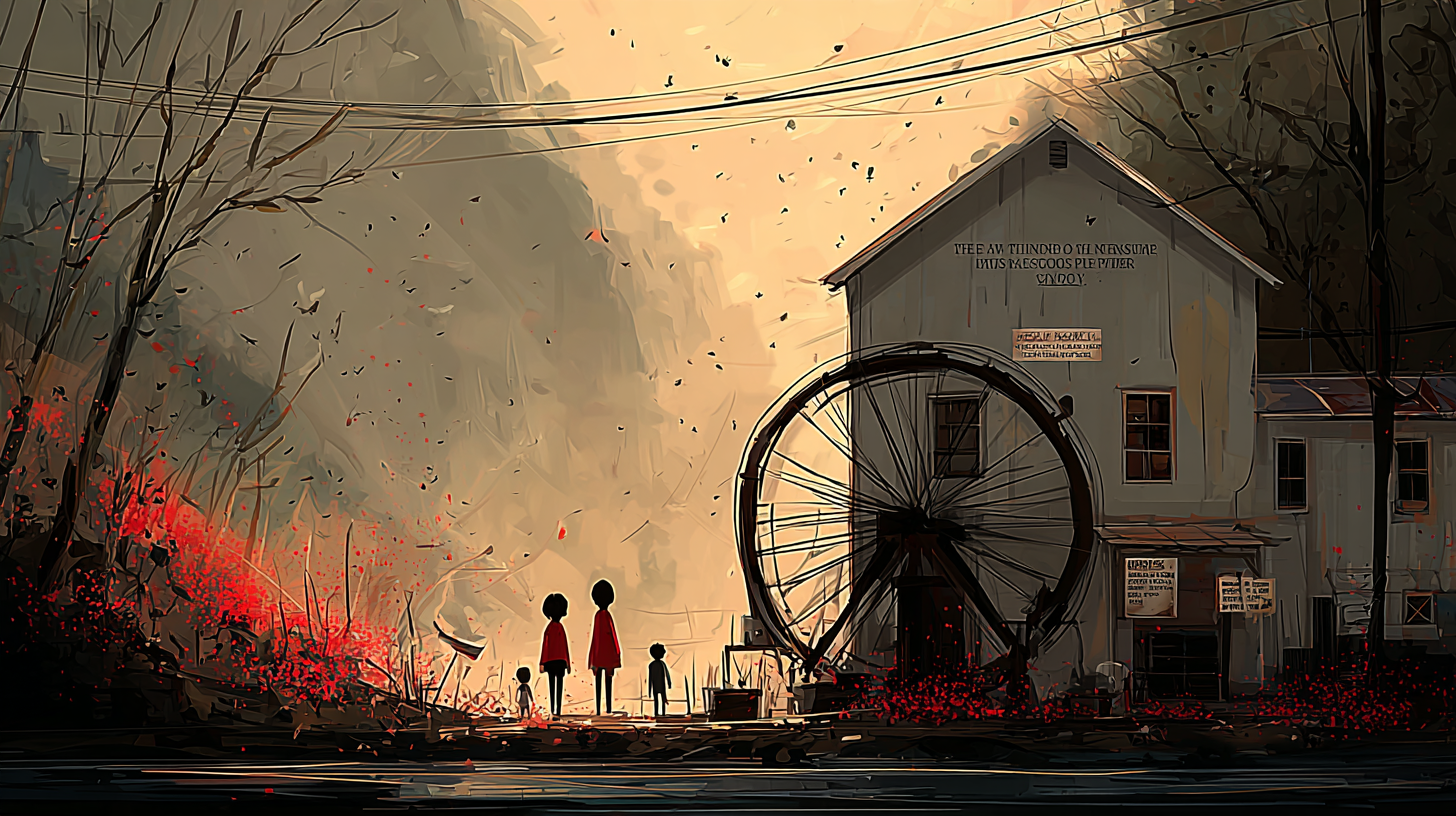“Mill” means a place or machine that makes flour or small pieces of something.
「mill」は、粉を作る工場や小麦を粉にすること。
以下は英単語 “mill” に関するストーリー型学習コンテンツです。まずは大枠の意味を理解して最後の文章で確認しましょう。
「mill」の主な意味(main meaning)
| 品詞 | 意味(簡潔) | 発音記号(IPA) | 英語例文 |
|---|---|---|---|
| 名詞 | 製粉所、工場 | /mɪl/ | The old mill by the river is now a museum. |
| 動詞 | 製粉する、細かく砕く | /mɪl/ | They milled the wheat into flour. |
「mill」の語源(etymology)
「mill」はラテン語の「molina(粉をひくところ)」に由来し、基本イメージは「何かを細かくする場所や行為」。そこから工場全体の意味にも広がった。
「mill」の類義語(synonyms)
| 類義語 | 英語例文 |
|---|---|
| factory | My uncle works at a car factory. |
| plant | The new power plant opened last year. |
| workshop | He built a table in his small workshop. |
| grinder | This grinder turns beans into powder. |
| foundry | The metal parts were made in a foundry. |
「mill」の反義語(antonyms)
| 反義語 | 英語例文 |
|---|---|
| field | The cows are grazing in the field. |
| farm | They live on a large farm with many animals. |
「mill」のコロケーション(collocations)
| コロケーション | 英語例文 |
|---|---|
| flour mill | This village still uses an old flour mill. |
| paper mill | The river was polluted by the paper mill. |
| textile mill | Many workers lost their jobs when the textile mill closed. |
| wind mill | A wind mill was used to pump water. |
| steel mill | He found a job at a local steel mill. |
「mill」の2項表現(binomials)
| 2項表現 | 英語例文 |
|---|---|
| mills and factories | Mills and factories were common in the 19th century. |
| nuts and bolts | He understands the nuts and bolts of running a mill. |
英語ストーリー(english story)
A Day at the Old Mill
Emma had always been curious about the old mill near the river. One sunny Saturday, she visited it with her grandfather, who used to work there when it was still a flour mill. “This was one of the busiest mills and factories in the town,” he said proudly.
Inside the building, she saw large wheels and machines. “We used to mill the wheat here,” he explained. Emma imagined how noisy it must have been. Now, the mill had been turned into a small museum. She read about other kinds of mills, like the paper mill and the textile mill, which helped the town grow.
Emma was most impressed by a small wind mill outside. “That one pumped water for the fields,” her grandfather said. “Not all mills made flour.” She learned that a plant or factory could also be called a mill when it produced something.
Before leaving, she saw a room called the workshop, where people once fixed tools. She realized how much hard work went into making simple things, like flour or paper. As they walked back, her grandfather said, “You’ve seen the nuts and bolts of history today.” Emma smiled. She felt lucky to learn about the past in such a real way.
和訳
古い製粉所での一日
エマは川のそばにある古い**mill(製粉所)にずっと興味を持っていた。ある晴れた土曜日、彼女はその場所を、昔そこに勤めていた祖父と一緒に訪れた。「ここはこの町で最もにぎやかなmills and factories(製粉所や工場)**の一つだったんだ」と祖父は誇らしげに語った。
建物の中には大きな車輪や機械があった。「ここで小麦を**mill(製粉)していたんだよ」と祖父が説明した。エマは当時の騒がしさを想像した。今ではこのmill(製粉所)は小さな博物館になっていた。彼女はpaper mill(製紙工場)やtextile mill(繊維工場)**など、町の発展を助けた他の種類の工場についても読んだ。
エマが一番感動したのは、外にあった小さな**wind mill(風車)だった。「あれは畑に水をくむためのものだったんだ」と祖父は言った。「すべてのmillが粉を作るわけじゃないんだよ。」エマは、物を作る場所はplant(工場)やfactory(工場)**とも呼ばれることを学んだ。
帰る前に彼女は**workshop(作業場)と呼ばれる部屋を見た。そこでは昔、人々が道具を修理していたそうだ。エマは、粉や紙のようなシンプルなものを作るのにも、どれほどの労力が必要かを理解した。帰り道、祖父は「今日は歴史のnuts and bolts(基本的な仕組み)**を見たね」と言った。エマはにっこり笑った。彼女は過去を身近に学べたことをうれしく思った。
「mill」のQ&A
- Q「factory」と「mill」の違いは何ですか?
- A
「mill」はもともと粉をひく場所や、回転する機械を使った古い工場を指します。一方「factory」はもっと広く使われ、現代のあらゆる種類の工場を含みます。
- Q「plant」と「mill」の違いは何ですか?
- A
「plant」は大規模な生産施設全般を指す語で、電力や化学製品などの生産にも使われます。「mill」は比較的小規模で、粉や素材を加工する工場を指すことが多いです。
- Q「workshop」と「mill」はどちらも作業場所ですが、どう違いますか?
- A
「workshop」は職人や修理工などが作業する小さな作業場を指します。「mill」は大きな機械で大量生産する工場を指します。
- Q「grinder」と「mill」はどう違いますか?
- A
「grinder」は物をすり潰すための機械自体を指します。「mill」は建物や設備全体を含み、生産場所という意味もあります。
- Q「foundry」と「mill」の違いは何ですか?
- A
「foundry」は金属を溶かして鋳造する工場のことです。「mill」は主に粉を作ったり、素材を加工するための工場です。用途が異なります。
- Q「mill」と反対の意味を持つ「field」はどういう関係ですか?
- A
「mill」が人の手で加工・生産する場所であるのに対し、「field(畑)」は自然のままの空間や農業の場であり、人工的ではない点で対照的です。
- Q「farm」と「mill」はどのように反対語とされるのですか?
- A
「farm」は自然に近い農業活動の場で、作物や動物を育てる場所です。「mill」はそれらの素材を加工する場所であり、自然と人工の違いが反対性に繋がります。
- Q「flour mill」「paper mill」「textile mill」の違いは何ですか?
- A
「flour mill」は小麦を粉にする工場、「paper mill」は紙を作る工場、「textile mill」は布や繊維を加工する工場です。いずれも「mill」ですが、扱う素材が異なります。
- Q「wind mill」はどういう意味ですか?
- A
「wind mill」は風の力を使って水をくんだり、小麦をひいたりする装置です。昔の農村でよく使われていました。
- Q「steel mill」はどんな工場ですか?
- A
「steel mill」は鉄鋼を作る工場で、鉄を溶かして形にする生産施設です。重工業の一種です。
- Q「mills and factories」という表現はどんな意味ですか?
- A
この表現は、昔の工業地帯などで「製粉所や工場」をまとめて指すときに使います。特に産業革命期の話題でよく出てきます。
- Q「nuts and bolts」はどういう意味で使われますか?
- A
もともとは「ナットとボルト」の意味ですが、比喩的に「物事の基本的な仕組み」や「実用的な詳細」という意味でも使われます。



コメント